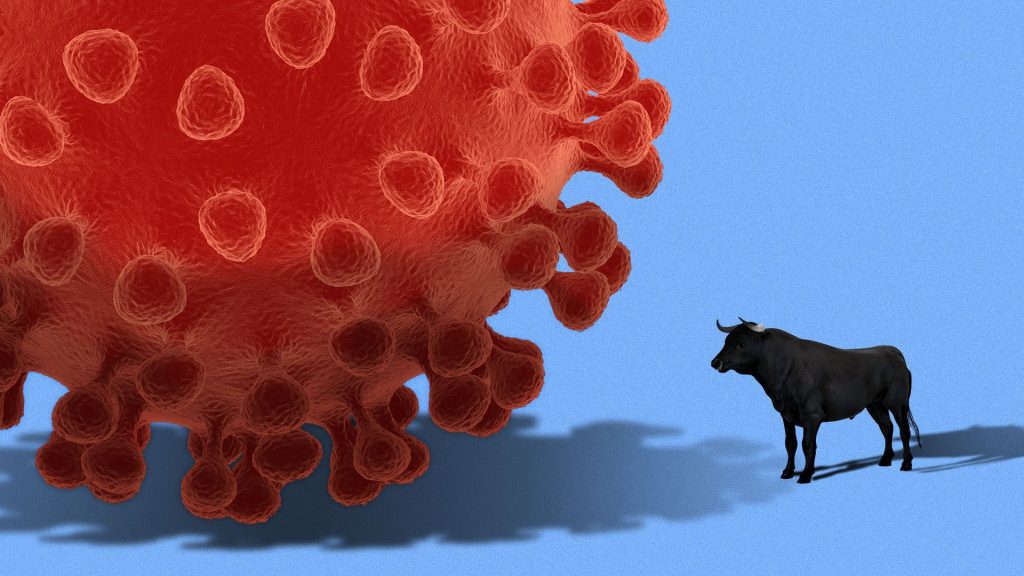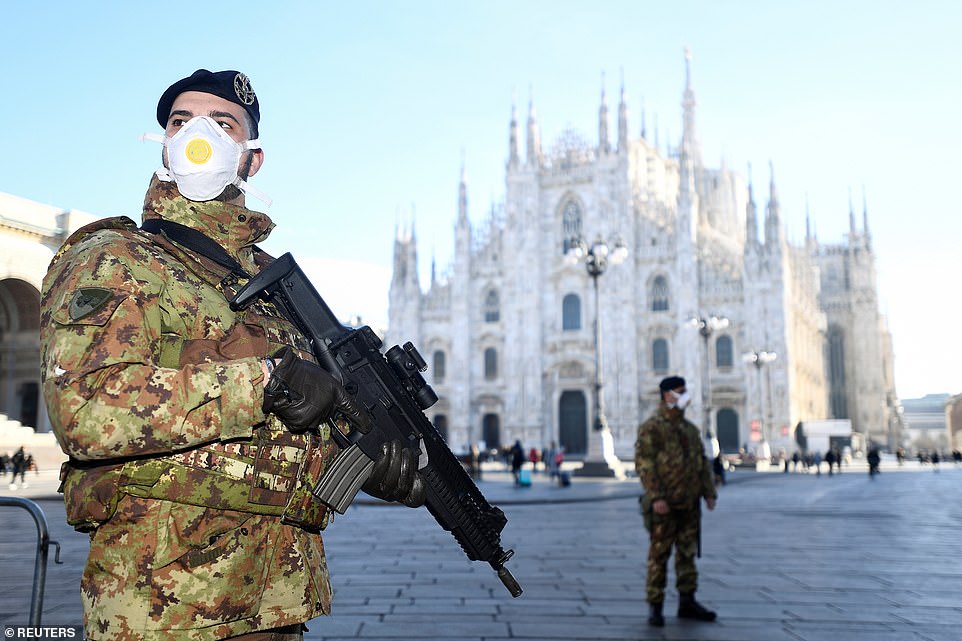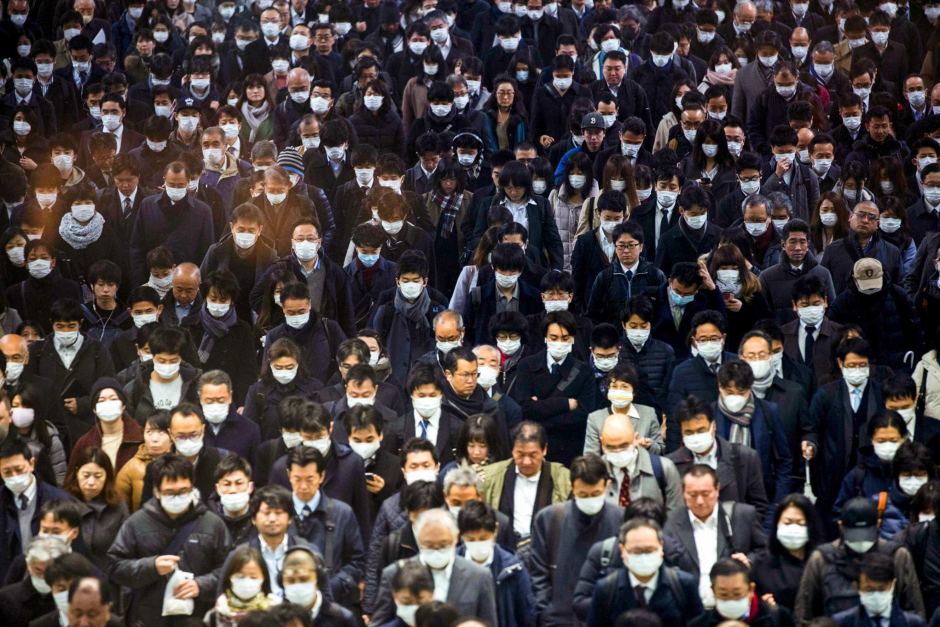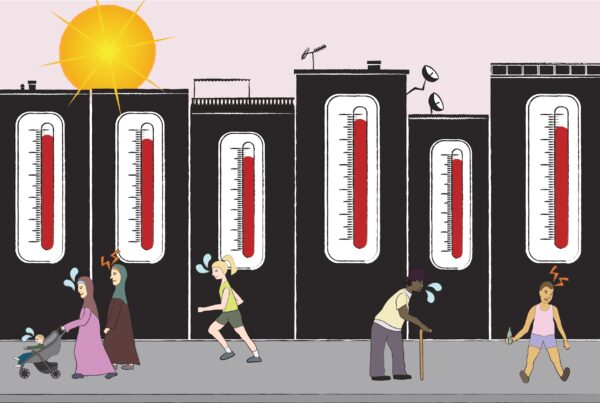By Emiliano Terán Mantovani.
What does the COVID-19 pandemic express, beyond itself? What is its meaning in this precise (geo) political time and what does it tell us about the particular world we face today?
March 23, 2020: The global coronavirus pandemic (COVID-19) quickly approached 400 thousand cases (367.457), registering the death of 16,113 people, which represents 4.38% of the total of these figures.
The general critical issue with COVID-19 is not its death rate, but the especially accelerated rate of contagion (easily from person to person), which becomes tricky in a globalized and very interconnected world. This implies a scenario of potential massive contagion on a planetary scale (how many more will be infected in the world?) which, on the one hand, could have a high cost in human lives (mainly the elderly) and on the other hand, would deepen the precariousness and unsustainability of the daily life in the current late and decadent globalization.
Not only health systems of the world’s most «developed» countries have collapsed (as in the case of Italy), but a good part of international and domestic trade is also paralyzed (due to the restrictions imposed to stop the pandemic), making factories and companies closure, increasing layoffs, downfall of economic projections by country, among others consequences. The interconnected effects of this situation have expressed in events such as the drop of the value of the currencies, the drop in oil demand (unprecedented) and prices; or the collapse of international stock exchanges (Dow Jones affected the second worst drop in its history in mid-March).
The current pandemic could cause more damage, or it could be overcome. We do not know so far. But all this that is happening tells us many more things. So we also need to try to interpret what this pandemic expresses, beyond itself; what is its meaning in this precise (geo) political time; what does it tell us about the particular world we face today.
Time of thresholds: Coronavirus is a symptom and a turning point
Every look, conversation, anguish and debate are on the global pandemic of COVID-19. But we have to talk about more things that are articulated with it. The pandemic is part of a historical process of contemporary capitalism: we are facing the pandemics of neoliberal globalization, which have been increasing and succeeding since the decades of the 80-90s. COVID-19 is just one more pandemic of a particular list that, to one degree or another, have constituted not only threats to humanity, but also warnings. SARS-CoV in 2002, the so-called «bird flu» (H5N1) in 2003, swine flu (H1N1) in 2009, Middle East Respiratory Syndrome (MERS-CoV) in 2012, Ebola in 2013 or Zyka (ZIKV) in 2015. According to the former Deputy Director-General of the WHO for Health Security, Keiji Fukuda, when avoiding these pandemics, “we feel that we have dodged a bullet”. But still, today, we continue to play with our luck.
However, the emergence of these pandemics of globalization has nothing of «natural disaster» or of a «fortuitous event that sooner or later had to happen». Rather, they are the result of the neoliberal advance of the commodification of life and occupation of new ecosystem frontiers, in the last decades: intensive and industrial agriculture and poultry (which caused the bird flu), trade in wild and exotic animals (as occurs in China), genetic manipulation, expansion of predatory tourism, deforestation, abuse of antibiotics, to mention some examples. Factors like these were enhanced with a transnational form of transmission, made possible by the expansion of the interconnections of human and merchandise mobility, the extraordinary growth of cities, the precariousness of public health systems, among others aspects.

Source: Sarah Grillo/Axios, from the original article at http://www.ecopoliticavenezuela.org/
This systematic degrading and predatory advance of capital, over the last decades – on the frontiers of life, on the limits of the planet, but also on the systems and institutions of social assistance – has been aggravating not only the incidence and features of global phenomena like these, but also the unsustainability of the current globalized system. To cite an illustrative example, the melting of ancient glaciers due to climate change could release 15,000-year-old viruses which are unknown to science and whose level of lethality is also ignored.
The particular time in which the COVID-19 pandemic arises is a revealing time which shows us a series of extreme events that are actually concatenated, such as the fires in the Amazon, the fires in Australia or the fact that 2019 has been the second warmest year on record. Ecosystems reach thresholds, in which a systemic process is opened, new properties are developed, sudden and accelerated changes are generated, which are going to modify the socio-ecological dynamics as we know them today. The years 2019-2020 are showing us this much more clearly.
And these thresholds are not just ecological. The entire system, which synthetically articulates the economic, cultural, social and political dimensions, with the networks and fabrics of ecological life, is been shuddered from deep within. That is why the COVID-19 pandemic appears as a fundamental trigger for an upcoming and very likely global economic recession, which is historically connected with the 2008-2009 economic crisis (which has marked our recent time), but also with the systemic crisis developed since the 70s of the 20th century, and even with the crisis of modern-western civilization. The pandemic of the new Coronavirus is one more symptom of the crisis of civilization that is going through us.
So, have COVID-19 and the pandemic that it has unleashed, something special, something different from the previous pandemics of globalization? Yes. It is true that much less is said about how viral hepatitis kills 1.3 million people a year worldwide; A similar figure occurs with traffic accidents (yes, the car kills!) and diarrheal diseases (suffered mainly by the poorest sectors of society), to mention dramatic examples. But we are facing another rhythm of contagion, of ‘virality’, which although it fundamentally kills specific sectors of society (such as the elderly), actually leaves nothing and no one outside of it. It filters any path the human transits. So, it integrates everything into its dynamics. Its potential massiveness (and today, with almost 400,000 infected, it is massive) saturates everything: it saturates medical systems and institutions, saturates politics and the media, saturates the perception of threat and death, saturates mobility and social interaction and also it saturates the State and power.
Of course, there are class, gender, and racial inequalities that determine who suffers the most and first this pandemic. But this goes beyond what the power and privileges system itself can control; it leaves the simulations of power bare. There is no one who can “see from the outside” of this anymore, so the level at which this challenges us is the highest. Paradoxically, capitalism, with its predatory, extractive and commodifying dynamics, infects its own trade routes, its markets, its institutions. It invalidates the ‘necessary’ expansive movement of capital. So, the level of contradiction is also the highest.
Unlike a century ago, when the ‘Spanish Flu’ killed about 50 million people, the current COVID-19 pandemic emerges in a global system that is much more fragile than before, much more unfeasible. We are more vulnerable than ever. It seems clear that a door has been opened that tells us that things will no longer be as they were before. And this also seems to reveal to us that, in the same way, we are moving towards a new management and organization of the system. So, end of globalization?
COVID-19 pandemic: bio-politics of the ‘emergency’ and its paradoxes
The maximum saturation caused by the COVID-19 pandemic has generated different responses from the States, each with different results (let’s think about the cases of China, Korea, Italy or Spain). What we see developing, in general, is the progressive adoption of strict quarantine measures by States worldwide, sustained by a warning by experts and scientific advisers that tell us the virus will reach a large part of the world population, and that social life on the planet will be noticeably disrupted for many months.

Source: Reuters, from the original article at http://www.ecopoliticavenezuela.org/
This clearly paves the way for the consolidation of the logic of an extraordinary situation, which allows democracy to be suspended and lay the foundations for the normalization and permanence of exceptional regimes. It is bio-politics at its maximum expression, which was already preceded by emergency regulations and new doctrines of national security, forms of militarization of society and territories, all of which have been generalized to the population as a whole in the name of the ‘fight against terrorism ‘, drug trafficking and organized crime, irregular armed groups, against the overflow of migration and against ‘vandalism’ in protests (remember last year in Latin America the relationship between protests and states of emergency). And it is worth adding: these logics are also in line with the rise of extreme rights in various parts of the world, which, from racist and nationalist positions, can attribute the situation to ‘foreign infections’, a permissive immigration policy and the need to autarkic economies (again, another factor to say goodbye to globalization?).
Iron and drastic social controls in the case of China, Taiwan, Japan, Korea and later and to a lesser extent Italy and Spain, have been expressed in things like the official prohibition to leave home; the establishment of reports per person (names, body temperatures, movements and trips, contacts with people, etc.) and then be processed in the form of ‘Big Data’; carrying out express tests, which, for example in the case of Korea, involved performing a nasal scraping on a ‘drive in’ to determine if the person was infected; among other measures, which in cases such as the Chinese, included the use of the army.
But precisely, due to this dynamic of maximum saturation of the COVID-19 pandemic, a first paradox should be highlighted: the success that China has had in stopping the expansion of the pandemic has opened ways of legitimation for this high intensity bio-politics (“let’s look at the Chinese example!”). The societal cornering that is created by the possibility of an overflow of the global pandemic can make a control society plausible and viable, under these bio-security criteria. So we could face a scenario not only of political imposition but also of consent of a sector of society. But what alternatives exist to this form of biopolitical governance, in this pandemic context?
If the development of the crisis of the civilization has brought us to this time of thresholds, of extreme events, of permanent emergency (remember the “climate emergency”), are we heading towards a capitalism which will be managed as a permanent “disaster capitalism”? How could democracy (or its possibility) work in a regime like that?
There is a second paradox or tension to highlight: the policy of strict quarantine measures is absolutely contrary to the need for mobility and dynamism that the markets have. Social confinement is a necessity but at the same time it is an economic suicide for capitalism. The governments of the world are in the dilemma between the epidemiological and economic debacle. And here it is worth noting what until a few days ago was the policy of the British Government led by Boris Johnson, in the face of the COVID-19 pandemic: a kind of bio-liberalism, ‘let it be, let it die‘. Sir Patrick Vallance, Head of the government’s scientific advisers, announced for the Sky News network on March 13, that «herd immunity» had to be achieved by letting 60% of the British population catch COVID-19, without placing greater social restrictions on mobility and activity. This would mean that some 40 million people should at least catch it over time to achieve this goal, with the Government estimating that at least 1% would die (about 400,000 people).
This chilling policy starkly underscored that, actually between life-saving and GDP growth, the Johnson government prefers the latter – and has recently said that it would «do anything» to protect the economy from the Coronavirus. But above all, it reveals an instrumental way of representing the lives of millions of human beings, within the quantitative category of ‘population’. Both, the iron control regimes and these bio-liberalisms, share this instrumental notion of human life, in which it is expressed into a functional number: 50,000; 500,000 or 5,000,000 people; 0.5; 5% or 15%. It all depends on what/who is useful or not. ‘Population’ term erases faces, personal stories, diversities, to be simply an operational matter of the State. But in any case, what is remarkable is that the Foucaultian biopolitical premise of «to make live, to let die» is maintained, now in the framework of a time of extreme events. For this bio-liberalism, what is revealed is a socio-Darwinian logic of abandonment of a part of society (surely, the oldest and sickest part), to the death (‘to their fate’).
This brings us to a third and final paradox that we would like to highlight: the State decision of who is confined, who works, who lives and who dies in this time of thresholds is in clear contradiction with the impulses of life that are expressed from below. If we have said that confinement, quarantine, is a necessity, at the same time it is socially unsustainable over time. For the billions of precarious people in the world, it is immediately unfeasible. For others, it represents a paralysis of yearnings, sociabilities, discontents, projects. Paralysis that occurs just when millions in the world had been mobilizing due to the unrest caused by the situation in their countries (remember Chile, Iraq, Lebanon, Hong Kong, Ecuador, Catalonia, etc). What pathways can these social discontents follow? But also, what about those others who refuse to be ‘collateral damage’, the new casualties statistics of this bio-politics of the ‘emergency’ (that could be our grandparents, the wise men and women, the masters of the community; or our brothers or colleagues, affected by one or another disease?
Paralysis and confinement can hardly dissolve the social discontents that have emerged and are emerging as a symptom of the decline of this prevailing system. This is known to the great administrators of this bio-politics of the emergency. For this reason the Johnson government also backslides on its «herd immunity» policy; that is why the French President Emmanuel Macron, a neoliberal, faced with the pandemic turns in his speech and states that public health is a precious asset that must be outside the laws of the market; that is why other governments back down on social cuts policies.
The three paradoxes mentioned above are actually part of a greater paradox: nothing is guaranteed, nobody can guarantee control of the situation anymore. The capitalist system shudders in its own constitution. Never in its history has capitalism had so many cracks as today.
What we do?
The social confinement of the quarantine, but also the empty or semi-deserted streets, the truncated markets, the confinement of the poorest to a strange slowed socio-economic precariousness, pave the way for us to other temporalities, other rhythms, other sociabilities, other appreciations and sensitivities. An opportunity to unfold the otherness, to unfold these logics and rhythms different from those of the capitalist system, never seemed so close at hand. The centrality, in the face of the challenges represented by this collapse / opportunity paradox, in the face of this capitalism that is being left bare, seems to lie in a politics of the commons, of care, of the reproduction of life. That path has been opened before us, without necessarily representing a guarantee of success.
But outside that particular space, in the space of the political arena, the times of capital, of the pandemic, of the biopolitics of the emergency, of climate change, continue to prevail. This still is the collective space of discontent, of struggles, of social demands, of transformation. How to connect that family or communitarian shelter, this “social distancing” with the need for reunion, for demanding to the power, for assuming power? While we take care of life in that particular space, we must continue to demand, requiring things like a radical redistribution of the existing wealth so that they are directed to universal assistance in public health, the suspension of the external debt repayment by poor countries of the Global South, suspension of the taxes to the poorest and to recover them from the richest sectors; socialize scientific knowledge, respect nature and stop the advance of commodification and the last frontiers of life on the planet, and a long etcetera.
The global emergency must be converted into the emergence of another system oriented to life, to the people. If the systemic collapse leads us to unthinkable scenarios, it is necessary, as claimed by a famous motto of May 68, to be realistic and demand the impossible. Another world, different from this, now.
—
This post was originally published in the webpage of the Observatorio de Ecología Política de Venezuela.
Emiliano Terán Mantovani is a sociologist at the Universidad Central de Venezuela. He holds a Master in Social, Economic and Environmental Sustainability (specialization in Ecoloogical Economics) and is conducting his PhD in Environmental Science and Technology, both at the Universitat Autònoma de Barcelona. He is a core member of the Observatorio de Ecología Política in Venezuela.





